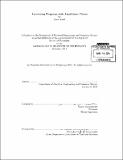Autotuning programs with algorithmic choice
Author(s)
Ansel, Jason (Jason Andrew)
DownloadFull printable version (23.18Mb)
Other Contributors
Massachusetts Institute of Technology. Department of Electrical Engineering and Computer Science.
Advisor
Saman Amarasinghe.
Terms of use
Metadata
Show full item recordAbstract
The process of optimizing programs and libraries, both for performance and quality of service, can be viewed as a search problem over the space of implementation choices. This search is traditionally manually conducted by the programmer and often must be repeated when systems, tools, or requirements change. The overriding goal of this work is to automate this search so that programs can change themselves and adapt to achieve performance portability across different environments and requirements. To achieve this, first, this work presents the PetaBricks programming language which focuses on ways for expressing program implementation search spaces at the language level. Second, this work presents OpenTuner which provides sophisticated techniques for searching these search spaces in a way that can easily be adopted by other projects. PetaBricks is a implicitly parallel language and compiler where having multiple implementations of multiple algorithms to solve a problem is the natural way of programming. Choices are provided in a way that also allows our compiler to tune at a finer granularity. The PetaBricks compiler autotunes programs by making both fine-grained as well as algorithmic choices. Choices also include different automatic parallelization techniques, data distributions, algorithmic parameters, transformations, and blocking. PetaBricks also introduces novel techniques to autotune algorithms for different convergence criteria or quality of service requirements. We show that the PetaBricks autotuner is often able to find non-intuitive poly-algorithms that outperform more traditional hand written solutions. OpenTuner is a open source framework for building domain-specific multi-objective program autotuners. OpenTuner supports fully-customizable configuration representations, an extensible technique representation to allow for domain-specific techniques, and an easy to use interface for communicating with the program to be autotuned. A key capability inside OpenTuner is the use of ensembles of disparate search techniques simultaneously; techniques that perform well will dynamically be allocated a larger proportion of tests. OpenTuner has been shown to perform well on complex search spaces up to 10³⁰⁰⁰ possible configurations in size.
Description
Thesis: Ph. D., Massachusetts Institute of Technology, Department of Electrical Engineering and Computer Science, 2014. Cataloged from PDF version of thesis. Includes bibliographical references (pages 231-251).
Date issued
2014Department
Massachusetts Institute of Technology. Department of Electrical Engineering and Computer SciencePublisher
Massachusetts Institute of Technology
Keywords
Electrical Engineering and Computer Science.